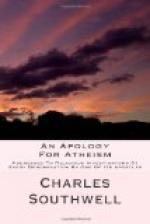Mr. Collibeer, who is considered by Christian writers ’a most ingenious gentleman,’ has told the world in his treatise entitled ’The Knowledge of God,’ that Deity must have some form, and intimates it may probably be the spherical; an intimation which has grievously offended many learned Theists who consider going so far ‘an abuse of reason,’ and warn us that ’its extension beyond the assigned boundaries, has proved an ample source of error.’ But what the ‘assigned boundaries’ of reason are, they don’t state, nor by whom ‘assigned.’ That if there is a God, He must have some form is self-evident; and why Mr. Collibeer should be ‘called over the coals’ by his less daringly imaginative brethren, for preferring a spherical to a square or otherwise shaped Deity, is to my understanding what God’s grace is to their’s.
But admitting the unfitness, and absurdity, and ‘blasphemy’ of such conceptions, it is by no means clear that any other conceptions of the ‘inconceivable’ would be an improvement upon them. The Author’s serious and deliberate opinion is, that ascribing to Deity a body analagous to our own, is less ridiculous than affirming he has no body; nor can he admire the wisdom of those Christians who prefer a partless, passionless God, to the substantial piece of supernaturalism adored by their forefathers. Undoubtedly, the matter-God-system has its difficulties, but they are trifles in comparison with those by which the spirit-God-system is encompassed: for, one obvious consequence of faith in bodiless Divinity is, an utter confusion of ideas in those who have it, as regards possibilities and impossibilities. The Author confidently submits that, no man having ‘firm faith’ in a Deity—without body parts and passions—can be half so wise as the famous cook of my Lord Hoppergollop, who said,
What
is impossible can’t be,
And
never never comes to pass.
He, moreover, confidently submits that, granting the existence of so utterly incomprehensible a Deity, still such Deity could not have caused nature, or matter, unless we deny the palpably true proposition of Spinoza, to wit—Of things which have nothing in common, one cannot be the cause of the other. In harmony with this proposition, Atheists cannot admit the supernatural caused the natural; for, between the natural and the supernatural it is impossible to imagine any thing in common.
The universe is an uncaused existence, or it was caused by something before it. By universe we mean matter, the sum total of things, whence all proceeds, and whither all returns. No truth is more obviously true than the truth that matter, or something not matter, exists of itself, and consequently is not an effect, but an uncaused cause of all effects.
From such conviction, repugnant though it be to vulgar ideas, there is no rational way of escape; for however much we may desire, however much we may struggle to believe there was a time when there was nothing, we cannot so believe. Human nature is constituted intuitively or instinctively to feel the eternity of something. To rid oneself of that feeling is impossible. Nature, or something not nature must ever have been, is a conclusion to which, what poets call Fate—




